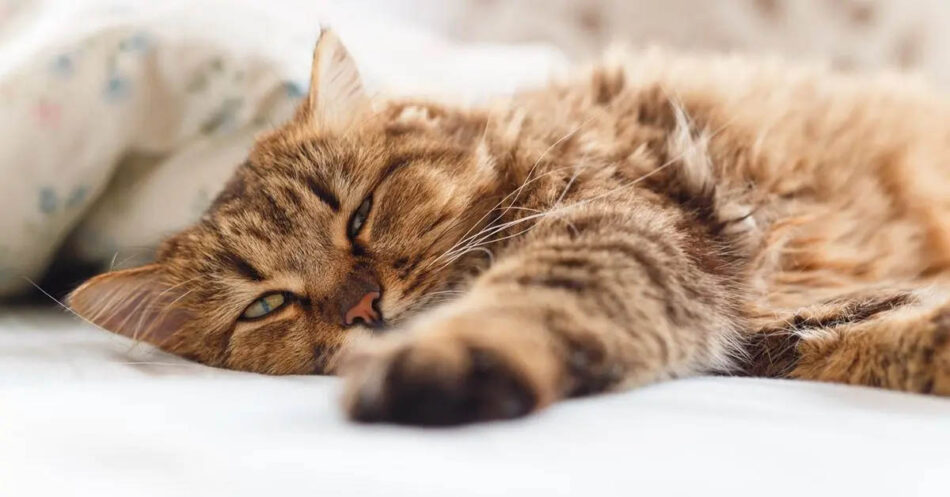
Everything You Need to Know About Cat Kidney Disease: Symptoms and Home Care
Our cats’ kidneys are responsible for filtering blood, which helps maintain healthy blood pressure, stimulates the bone marrow to make more red blood cells, and much more.
These two small, bean-shaped organs are essential to the life of our feline companions. What happens, though, when our older cats’ bodies stop working as they used to, and how can we keep our cats comfortable throughout their older years?
Pin Me!

Kidney (Renal) Disease in Cats
Although some cats are born with kidney problems, what I’m focusing on today is Chronic Kidney Disease (CKD), or chronic kidney failure. Chronic kidney disease is the persistent loss of kidney function over time and is very common in older and even middle-aged cats.
Symptoms of chronic kidney disease in cats Include:
- Frequent urination, bloody urine, or cloudy urine.
- Excessive thirst.
- Weight loss or loss of appetite.
- Stomach issues such as vomiting, constipation, or diarrhea.
- Recurring bladder or kidney infections.
- Mouth ulcers or a dull brownish-colored tongue.
- Bad breath. It may smell like ammonia or urine.
- Dry skin, coat, or eyes.
- Weakness, irritability, or fatigue.
The only definitive way to know if your cat has chronic kidney failure is to have her evaluated by a veterinarian who can run tests to diagnose the problem. Cats under seven need an annual vet wellness visit, and cats over seven will require bi-annual visits.
Early diagnosis is key to having a better prognosis for your cat with chronic kidney failure. Kidney disease cannot yet be cured, but treatment can prolong life.
Home Care for a Cat with Kidney Disease
In addition to seeking help from your veterinarian for kidney treatments, there are things that you can do to make your feline with kidney failure have a better quality of life.
Hydrate, hydrate, hydrate! Drinking a healthy amount of water will help your cats’ urinary tract, including the kidneys. Encouraging your cat to drink is one of the best things that you can do for her. My cat Olivia is a bit of a water bowl snob, so I’ve had to get creative to keep her hydrated. What works best for her is the Catit Flower Fountain.
From a scientific standpoint, cats are more inclined to drink from moving water. This is because of their natural instincts. In the wild, moving water is usually cleaner than stagnant water, so using a fountain rather than a bowl will encourage her to drink!
In addition, the Catit Flower Fountain uses a special filtration system to keep their water clean and healthy for your kitty.
Protect against accidents. Your cat may lose control over her bladder as kidney failure advances. Placing training pads down in her favorite areas can help soak up her potential accidents, making clean-up less of a hassle for you. Training pads are marketed for dogs but work well for felines too.
In fact, even though my cat doesn’t have kidney failure, I often buy large training pads to put under the litter box because sometimes Olivia “misses the box” and pees just outside it. Find more litter box hacks here.
Add a renal supplement to your cats’ daily routine. Vetoquinol Renal K+ Potassium Supplement Gel is a great option. It comes in a tasty maple-flavored gel to support normal renal health in your cat’s kidneys. I personally prefer supplements, like this one, or ones that are disguised as a treat. Olivia always refuses pills even if they are hidden in food. If your kitty is the same, then try this gel supplement.
Choose a kidney-healthy diet. Some cat food brands have formulas that are specially created for cats with kidney problems or for older cats in general.
Best Senior Food for Cats with Kidney Disease
Purina Pro Plan PRIME PLUS Senior 7+ Adult Dry Cat Food is one of my go-to suggestions for senior cats in general because it provides healthy vitamins and minerals older cats need such as vitamin E and omega-3 fatty acids from fish oil.
Purina Pro Plan FOCUS Urinary Tract Health Adult Wet and Dry Food is a great option for a cat that you suspect is beginning to have renal issues. It’s designed to help maintain cats’ urinary tract health by reducing urinary pH and providing low dietary magnesium.
Blue Buffalo Natural Veterinary Diet K+M Kidney + Mobility Support Grain-Free Dry Cat Food or Wet Canned Cat Food is made with controlled levels of sodium and protein to help manage your kidney disease in cats. You’ll need a prescription for these Blue Buffalo foods, but a diet prescription is easy to obtain. Simply place your order with Chewy.com and they’ll reach out to your veterinarian for approval.
Extra Care & Attention for Your Senior Cat
Remember that your older cat will have increased aches and pains as they age further, so be extra caring to them. This is especially true if they have health issues such as CKD. Even in their senior years, though, cats still have a lot of love and companionship to exchange!
FAQs
What Is the Difference Between Acute Kidney Disease and Chronic Kidney Disease?
Acute kidney failure in cats happens quickly, often in just a few days, and can be caused by things like poisons (antifreeze or lilies), infections, or blockages. Cats with acute renal failure could regain some kidney function with the right treatment and care, but unfortunately, about 50% of these cases are terminal. But if a cat does recover, her outlook is usually better than those with chronic kidney failure.
Chronic kidney disease in cats, in contrast, develops slowly over months or years and is typically due to a gradual loss of kidney tissue. Chronic renal failure is often difficult to treat effectively, with symptoms appearing when about two-thirds of the normal kidney tissue has been lost. The condition eventually leads to end-stage kidney failure in cats (or end-stage renal failure [ESRF]), which is considered stage 4 of kidney disease.
Often, pallative care is required for cats with end-stage kidney failure. They should be given lots of love and attention and kept warm and comfortable in their final days.
What Causes Chronic Kidney Disease?
Chronic kidney disease or kidney failure in cats is often the end result of various diseases and conditions rather than a specific disease itself. Some of the causes and factors leading to kidney failure in cats include:
- Genetic conditions: Certain breeds are more prone to conditions, like polycystic kidney disease, common in long-haired cats, and amyloidosis, particularly seen in Persians and Abyssinians. These conditions cause abnormal protein deposits or cysts in the kidneys.
- Infections and inflammation. Pyelonephritis, a bacterial kidney infection, and glomerulonephritis, inflammation and damage to the kidney’s filtration membrane, can lead to chronic kidney failure if not treated effectively.
- Cancer. Various tumors of the kidney, like lymphosarcoma, can impair kidney function.
- Viral infections. Cats with viral infections such as feline leukemia virus (FeLV) and feline infectious peritonitis virus (FIP) are at increased risk.
- Kidney stones or ureteral stones. These can cause blockages and damage to the kidney tissues.
In chronic kidney failure, aside from genetic predispositions, blockages in the urinary system and autoimmune diseases where the immune system attacks the body’s organs can contribute to the disease’s progression.
For acute kidney disease in cats, common causes include:
- Ingestion of toxins: Such as toxic plants, antifreeze, rat poison, and certain human medications.
- Dehydration and infection. Dehydration and bacterial infections in the urinary tract can severely affect your cat’s kidneys.
- Trauma and illness. Trauma such as a ruptured bladder or broken pelvis, illnesses like cancer, clotting disorders, low blood pressure, heart failure, and shock from blood loss or other causes can lead to acute kidney failure.
- Medications. Some medications, including certain chemotherapy drugs and antibiotics, can also be harmful to your cat’s kidneys.
Can a Cat Recover from Kidney Disease?
Treating kidney failure in cats can be done if the condition is caught early and treated right away. This treatment might include hospital care with special fluids and medicines. The chance of getting better depends on what caused the kidney problem and if it was treated quickly. However, if a cat’s kidneys are badly damaged, like from antifreeze poisoning, recovery is less likely.
Chronic kidney failure in cats, however, which gets worse over time, has no cure. Veterinarians will probably advise you to keep the cat as comfortable as possible and will recommend ways and medication to manage the symptoms—often they’ll focus on slowing down the disease rather than curing it. In severe cases of acute kidney injury, intensive care is needed, but the success of treatment varies and can be expensive. Even with the best care, some cats with serious kidney issues might not recover.


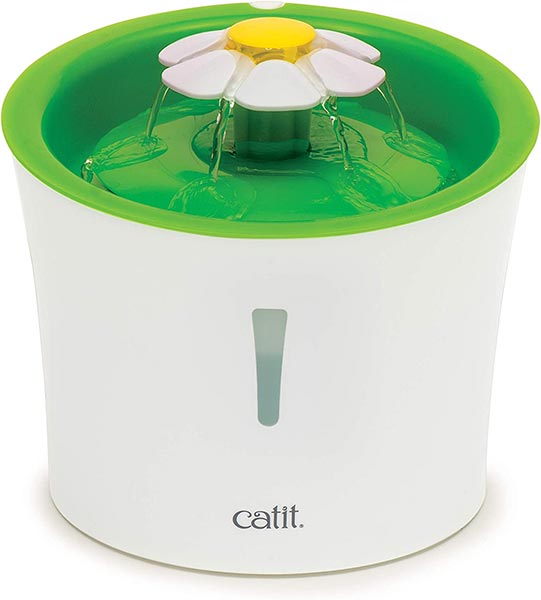





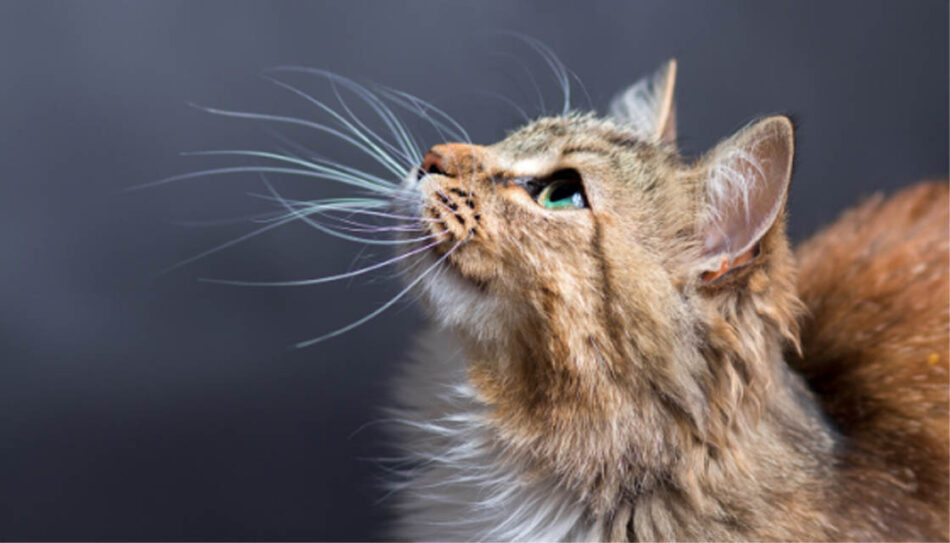
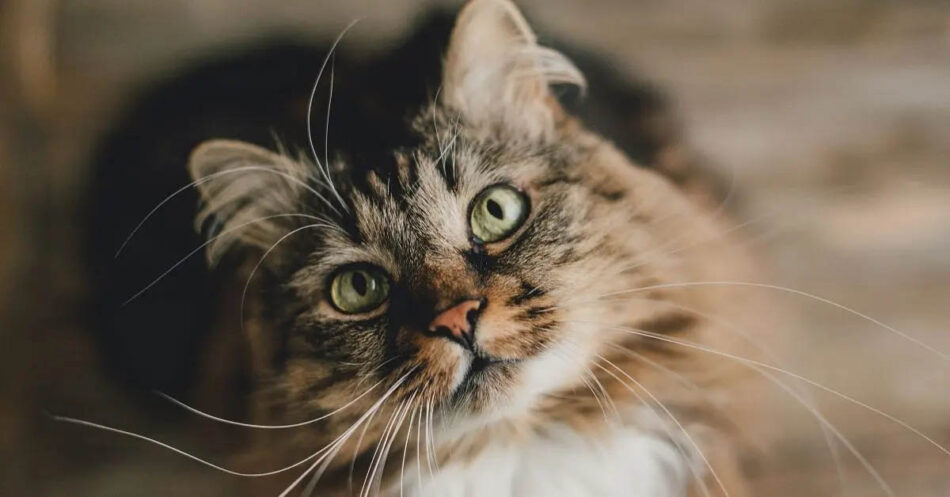
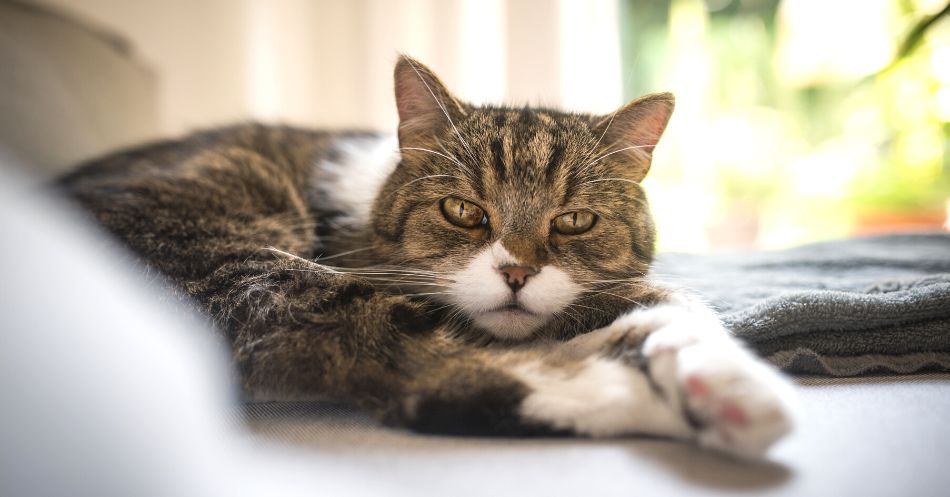
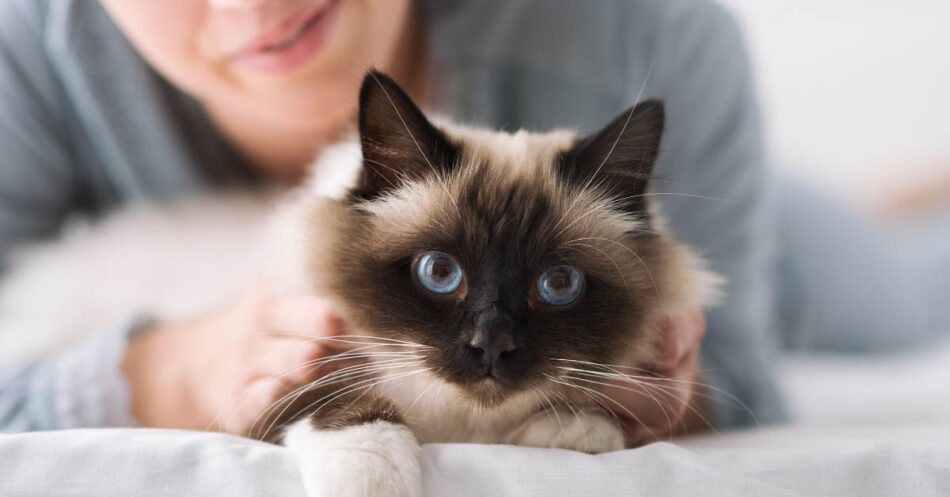
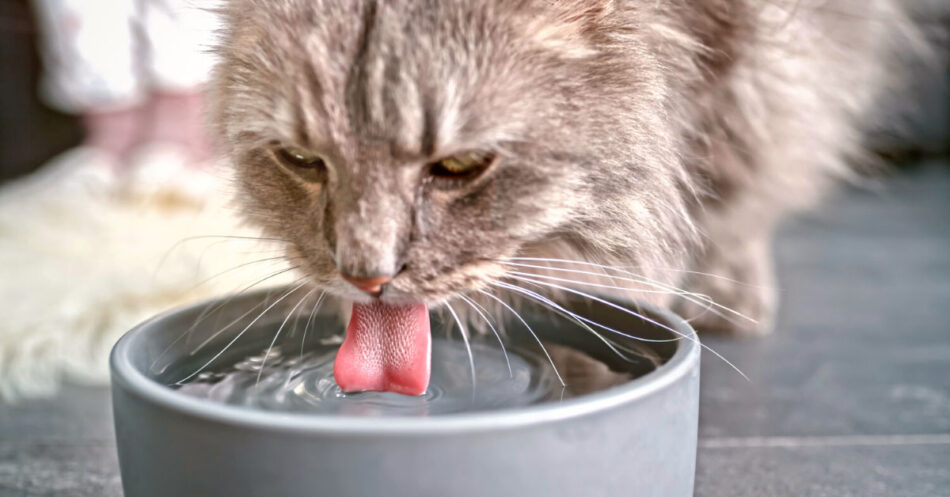
My cat Hermione, age 18, has been on Royal Canin perscription renal cat fiod for a few years and may be allergic to it. Is there another brand of renal cat food that may be a better option from an allergy standpoint? We switched her to a hydrolized protein food from Royal Canin temporarily, but I’d prefer to keep her on a kidney maintenance diet if possible. She likes a combination of wet and dry food.
Hi Stacey,
Wow, Hermione is 18! You must take great care of him. Bless you!
There are three other renal support diets for cats that I’m aware of. They are Hills Science Diet, Purina Pro Plan NF, and Blue Buffalo K + M (kidney and mobility). I found them all on Chewy.com
I hope Hermione likes one of them!
Kristen
Hello,
We took our older cat in today to a medical hospital. It was reccomended by a veterinarian. We were told that she has severely elevated kidney values according to the blood work. Our cat hasn’t been eating or drinking the past 3-4 days. The odd thing is, she only started acting differently about a month ago when we started to clean her new kitty pad with bleach. Last week we threw out that pad and cleaned our washroom (where her litter box is) with just soap and water.
The veterinarian said that we basically are out of options, they want to uthenize her. I don’t agree. I believe their are always other options.
We brought her home today after they injected her with fluids and gave her wet cat food with some extra water added into her food. She ate almost all her food. She hasn’t touched her water yet, we are just thinking it’s because of the fluids she was given today.
Do you have any tips we can try to get her to drink her water?? We got her a new water bowl that looks more like a waterfall (it was the only one available)
Sydney,
I’m so sorry your kitty has been sick. It truly breaks our hearts when our pets aren’t well. And when it comes to our pet’s health, it’s sometimes helpful to get a second opinion. Especially with something so serious. Since I’m not a veterinarian, I can’t say for certain. But it does sound like maybe your cat was hydrated after receiving fluids and wet cat food. My cat, Olivia, loves to drink from her water fountain (https://amzn.to/3pLxs0V). Giving your cat wet food, with water added is another good way to boost her hydration.